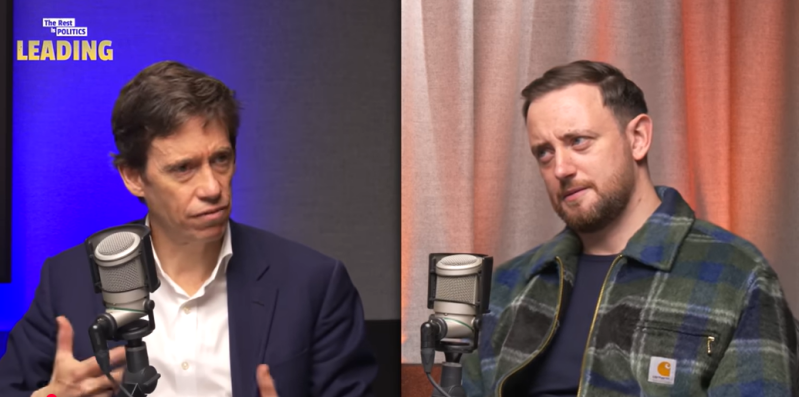
A high-profile U.K. podcast is drawing new attention to questions of justice, forgiveness and prison reform through the real-life story behind a transatlantic stage play now running in London’s West End. “Can the Justice and Prison System Be Truly Transformed?”—the title of the latest episode of The Rest Is Politics: Leading—examines the aftermath of a single punch that killed a young paramedic in 2011 and the unlikely journey of remorse and reconciliation that followed.
The discussion, released on YouTube on Nov. 24, is hosted by Rory Stewart, a former Conservative Minister of State for Prisons, Parole and Probation, and Alastair Campbell, formerly Downing Street Press Secretary for previous Labour Prime Minister Sir Tony Blair. Their conversation with playwright James Graham and former prisoner Jacob Dunne explores the limits of traditional punishment, the potential of restorative justice, and whether a polarized society still has space for forgiveness.
Graham’s play Punch, which recently ran on Broadway and is currently at the Apollo Theatre in London until Nov. 29 before touring regional theaters, dramatizes Dunne’s story as captured in his memoir “Right From Wrong: My Story of Guilt and Redemption.” It recounts how Dunne, then 19, killed 28-year-old trainee paramedic James Hodgkinson with a single punch in Nottingham in the early hours of July 30, 2011.
The tragedy happened when Dunne celebrated a friend’s birthday by imbibing drugs and alcohol. His mates called him to say trouble was brewing not far from a pub in the Old Market Square in the city of Nottingham, England. Looking for confrontation, Dunne joined them.
Hodgkinson had been watching cricket in Nottingham with his father and brother before the altercation happened and Dunne punched him. He was taken to a hospital critical care unit with a suspected brain injury and died nine days later.
Police arrested Dunne a month later on suspicion of murder. He was sentenced to four years in prison, reduced after he pleaded guilty to manslaughter and because of his young age. He served 14 months before being released on New Year’s Eve 2012.
However, the story did not end there.
After his release, Dunne entered a restorative-justice program run by an organization called Remedi, where he met his victim’s parents, Joan Scourfield and David Hodgkinson. Stewart and Campbell described them as “the real heroes” for undertaking a difficult journey of forgiveness toward the man who killed their son.
The story echoes another restorative justice outcome previously reported by Christian Daily International when Australian Danny Abdallah and his family publicly forgave drunk driver Samuel Davidson after he sped down a Sydney road in 2020, killing three of Abdallah’s children and their cousin as they went to get ice cream.
Graham said the themes of forgiveness and redemption at the heart of Punch have deeply moved audiences. He attributed that impact to Hodgkinson’s parents, who he said carried out “the most remarkable act of forgiveness and compassion and kindness” in what he called a “cruel age or a difficult time.” The moment when Dunne meets his victim’s parents, he added, offers a powerful example of “coming together across a divide.”
“We talk about divides all the time but the most chasmous divide you can possibly have is if somebody lost their son and they had had to reach out to the person who took him,” Graham said. He thought the main challenge for audiences watching the play was trying to imagine if they could forgive the killer of a loved one, in such a given situation.
Graham, known for his political plays, also referred to Dunne’s story as saying something about the limitations of societal “systems” akin to a “Dickensian story.” The former prisoner grew up in a difficult environment since he was failed by the systems of courts, prison and probation, according to the playwright.
Graham said Dunne’s story also highlights the damaging patterns of collective masculinity that shape many young men. Dunne described how men between 18 and 25 often rely on a limited “emotional toolkit” to cope with pressure or a search for meaning, turning to behaviors learned in their environments rather than healthier alternatives.
In Dunne’s case, this typically led to drinking and fighting. In Graham’s case, it was crying, reading or going to a local ice rink. Both men came from similar working-class backgrounds, but Graham had the advantage of his parents encouraging him in literacy and pursuing opportunities. His emotional toolkit, the resources he deferred to when pressured as a young man, was therefore more wholesome by comparison.
Dunne said people often asked him the same predictable questions about “the punch,” his emotions afterward and his time in prison. He suspected some of that interest was “sometimes sensationalist” and felt little need to retell the story to strangers. Instead, he said he hoped to encourage a broader public conversation about the wider implications of his case and about justice and restorative justice.
He has since co-founded the Common Ground Justice Project, seeking constructive public dialogue on justice, “to unstuck the public debate and find pragmatic solutions to move this forward.”
Stewart pressed into exploring the issue of forgiveness and redemption on the podcast show. He labelled it the “dominant theme of our culture.” At one point, he questioned if those deemed “evil” had really thought through the realities of their actions and the effect on others.
“I think we often seem very unforgiving,” said Stewart. “If you look at a headline in a newspaper, [saying] so-and-so is evil, often a public figure, could be a politician, they've done something absolutely terrible, and there's a real drive. They must be punished. They must be held accountable.
“There's very little room for the idea of forgiveness. Very little room for saying that could have been me… this person's going to have a chance to turn that around… they're going to be forgiven. I feel we're a very vengeful, angry culture that wants to find people to go after.”
Graham agreed saying he saw the past 15 years in modern society as evidence of a drive for vengeance rather than forgiveness. The discourse, he said, has changed to competing and winning, and being wowed by YouTube “thumbnail headlines.”
“Owning, crushing, destroying is celebrated,” opined Graham. Politicians are sometimes “celebrated for being a bully, for standing on top of people and winning in that way. There’s very little celebration of compassion and empathy.”
Dunne said the narrative around what happens after a crime has become “stuck,” and that the play reflects this by showing characters who “don’t know how to move forward.” He noted that his victim’s parents were themselves trapped in their grief, unable to get basic answers about how he was spending his time in prison or whether he understood the impact of the harm he caused.
He said Hodgkinson’s parents had even been denied answers by authorities at the time because of “data protection” and lacked support as victims as they tried to find ways to somehow “move forward after the loss of their son.”
Dunne also said the prison system gives offenders little chance to express remorse, keeping them locked away for long hours with no opportunities—and often no awareness—that communication with victims is even possible.
In his own situation, he had personally felt stuck with a “bleak future ahead”, as epitomised in the play, “feeling pessimistic about the world, not feeling I could enter the job market, like I could contribute, no qualifications… no fixed address when released from prison.”
“When you broaden that out as a lens and look at the justice system, that is a debate that has been stuck for decades… the prison crisis… the overpopulation… people being released early,” said Dunne. “And the debate about justice reform is stuck in terms of ‘tough on crime, soft on crime.’”
Furthermore, Dunne explained how restorative justice asked the right questions and looked at the needs of everyone involved in the situation of crime and punishment. This is alongside finding room from all to participate in the conversation “to find a way forward with pragmatic solutions that get everybody’s needs met.”
Dunne said that the loving attention given to him by his victim’s parents in wanting him to make the most of his life, to get an education, to be a contributor to the wider community, really helped him to find hope and progress in his life.
Stewart then asked Dunne how he responds to people who believe he should continue to feel guilt for his crime or question whether he has taken enough responsibility. “People may want you to feel guilty,” Stewart said. “In that case, how does forgiveness work?”
“Why do human beings find the concept of forgiveness and moving forward so difficult?” Stewart also asked, rhetorically.
In response, Dunne said audience members at post-show discussions for Punch often asked whether the forgiveness shown by Hodgkinson’s parents had a Christian basis. “Religion often talks about the need to forgive in order to move forward,” he said. But he offered a broader explanation, calling forgiveness “a gift to yourself—not to be trapped and consumed by bitterness and anger and hate, which will spill over into everyone around you.”
Dunne explained that Joan, the victim’s mother, chose to forgive after “not recognising the person she was anymore.” She told him, “my son wouldn’t want me to become the person that I’m becoming.”
“And so, forgiveness for them wasn’t motivated by a religious context,” said Dunne, “it was motivated by a need to be able to live well or to be — as James [Graham] uses a quote in the play, to ‘become the best version of myself.’”
However, Dunne found it hard to forgive himself, calling it a “tricky journey.” He said looking into the eyes of his victim’s parents and seeing the grief there for their son, was “a lifetime sentence” and “I’ve opened my heart to that now and I can never not remember that.”
“I find it hard to say I truly forgive myself,” he said, “and I think a lot of my work is sometimes motivated by guilt, which isn’t healthy either and that need to give back, and a need to try and make an impact on the world, and help young people and stop more punches being thrown, and fighting the common ground in public discourse, and make as much good come from this story as possible.
“But that’s going to be a lifelong journey of mine.”






